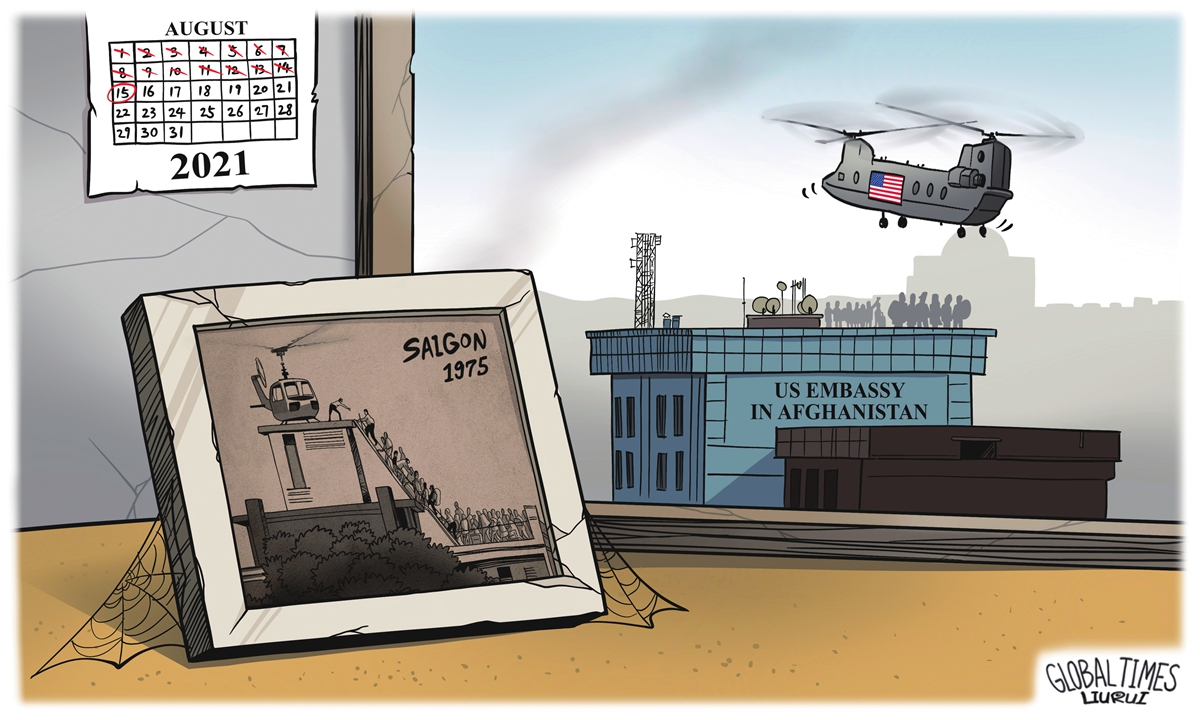
Illustration: Liu Rui/GT
During her visit to Singapore, US Vice President Kamala Harris on Tuesday accused China of "coercion" and "intimidation" in the South China Sea and asserted that the US "stands with our allies and our partners."Harris attempted to use a hard-line stance toward China and verbal promises to offset the impact of the US' shameful withdrawal from Afghanistan on its reputation and to incite a few Southeast Asian countries to confront China. But the image of the US debacle at Kabul airport is worth a thousand words. It is believed the Southeast Asian countries which have undergone enough geopolitical tests are clear about this.
Even before the drastic changes in Afghanistan, countries, including many US allies, have refused to take sides between China and the US. The Biden administration has used up all its strength to establish an anti-China united front, but it achieved little. So far, none of the countries in Southeast Asia, which have sharp insight, show willingness to take the lead in provoking China. The US' coercion and coaxing in this region have come to show signs of failure.
The US strategy of withdrawing from Afghanistan, contracting its military presence in the Middle East and enhancing geopolitical rivalry with China in Southeast Asia will soon prove useless, because it cannot make Singapore and Vietnam risk China ties to serve US interests. Meanwhile, the decline of US influence in the Middle East will lead to serious uncertainties that will eventually threaten US interests. The US is bound to suffer for that.
The only countries that the US can fool may be just tiny ones like Lithuania. Lithuania has taken the lead in developing ties with the island of Taiwan via provocations against the one-China principle, in exchange for absolute protection from the US.
Obviously, it has misjudged the situation. It is confronting both China and Russia, which have plenty of means including joining with Belarus to impose long-term sanctions on Lithuania and make it pay a heavy cost.
The Taiwan authorities have tied themselves tightly to the US, but the US will not offer unlimited support to the island at the cost of US own interests. The US wants to make use of Taiwan island to harass and contain the Chinese mainland - this determines that the nature of the relations between the US and the island of Taiwan will not change. When faced with the Chinese mainland's determination for a military showdown, the US is destined to retreat. What the Democratic Progressive Party authority promotes now is only a path of daydreaming.
China and Russia should unite different forces to humiliate the US over the Lithuania issue and the Taiwan question, generating a new, universally comprehensible "Afghan effect" in different forms. Washington's arms are way too long, so Beijing and Moscow should cut them short in places where Washington shows its arrogance and parades its abilities.
The "Afghan effect" is, in fact, already starting to take effect in Southeast Asia. Singapore's stance has become more neutral compared to years ago when it used to tilt toward the US, while Vietnam has separated the South China Sea issue from the overall Vietnam-China relations. All these prove that Southeast Asian countries are prepared for the "Afghan effect" in advance, let alone Vietnam that has vivid memories of the "Saigon moment."
The US has a population of over 300 million, and the total scale of its industrial production is far below the scale in its peak era. The US believes that with its great military power and financial hegemony, plus a few key technologies, it can bully China, a rapidly developing, hardworking country that has four times the US' population. China will prove the US wrong with facts.
Washington is wrong because it is overambitious. It has seriously overestimated its power to rally supporters and the geopolitical significance of its "shared values" with some countries. Moreover, it has made a misjudgment over the meaning of certain countries' sense of discomfort over China's rise. Washington thinks its hegemony is a matter of life or death for many countries. It assumes they will even leap into a boiling cauldron or a blazing fire to safeguard US hegemony as if this is their core interest.
The battle lines of Washington have become too long. The US' "Afghanistan complex" will take place again and again across the world in all forms. This will be not only a process where the US' influence wanes and becomes infamous, but also a vivid reflection of the US' decline.






